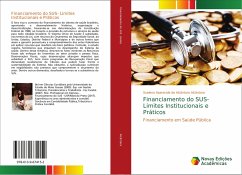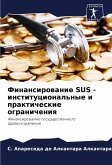The book presents the context of the financing of the Brazilian health system, pointing out its historical development, organization and decentralization, based on the determinations of the Federal Constitution of 1988, with regard to the provision of health structures and services for all Brazilian citizens. The Unified Health System is subsidized, under the terms of the Law, with resources from the Social Security Budget, from the Union, States, Federal District and Municipalities and from other sources that aim to guarantee percentages and commitment from the federative entities to apply resources that result in public goods. However, the study records phenomena that impact on the performance of the health system. Within this theme, facts inherent to tax waivers are described, focusing on incentives for the private sector and individuals, tax exemptions, which include taxes that subsidize the SUS, as well as tax recovery programs that require the receipt of taxes that can address the sustainability of the system. Nevertheless, judicialization culminates in unforeseen demands that compromise the sector's budget. Among other demands, it has become challenging to sustain the SUS.
Bitte wählen Sie Ihr Anliegen aus.
Rechnungen
Retourenschein anfordern
Bestellstatus
Storno








